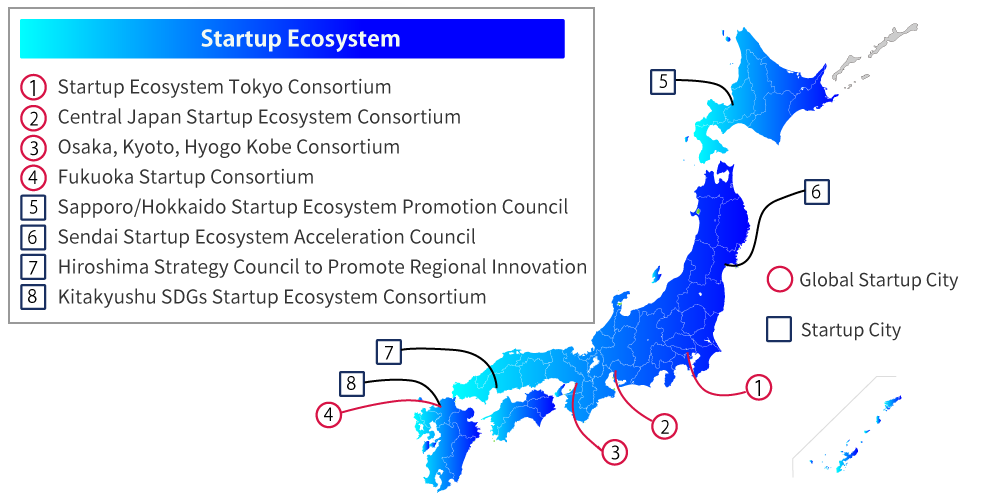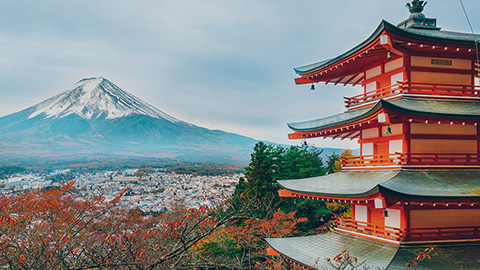Foreign Startups, Businesses Flock to Regional Japan for Innovation
April 2023

HAYASHI Ikuo, Bayer’s Alliance Manager in Japan
Several years ago, German pharmaceutical manufacturer company Bayer had a plan for a new R&D innovation site in Japan––but needed a location. The idea was to set up an incubator for startup ventures specializing in the life sciences, giving them everything they would need to run experiments, hold meetings and conduct their everyday business. The company had been operating startup incubators in Germany and the US for years, but this was its first in Japan.
Anyone who assumed Bayer was hunting for property in Japan’s top commercial centers––Tokyo, Yokohama, Osaka, Nagoya––would have been wrong. The German company’s choice: Kobe, the country’s seventh-largest city, with just over 1.5 million residents.
Bayer’s CoLaborator Kobe![]() opened in 2018, the first startup incubator launched by a foreign pharmaceutical company in Japan. With fully equipped labs––safety cabinets, cell incubators, fluorescence microscopes, spectrophotometers, autoclaves and much more––offices and meeting rooms, it accommodates companies from around the world that specialize in oncology, cardiology, gynecological therapies, and new technologies for developing drugs.
opened in 2018, the first startup incubator launched by a foreign pharmaceutical company in Japan. With fully equipped labs––safety cabinets, cell incubators, fluorescence microscopes, spectrophotometers, autoclaves and much more––offices and meeting rooms, it accommodates companies from around the world that specialize in oncology, cardiology, gynecological therapies, and new technologies for developing drugs.
The incubator is the kind of opportunity for startups that’s becoming more widely available as Japan revamps its economy, carries out regulatory reforms and channels more resources into reinvigorating regional communities. “We need to leverage external resources by welcoming startups or talent from across the world to revitalize the innovation ecosystem, especially in life sciences,” says HAYASHI Ikuo, Bayer’s Alliance Manager in Japan.
This is the new reality of foreign direct investment in Japan. Foreign companies and startups venturing into the country aren’t choosing only the big cities. They’re looking to Japan’s regions for the unique strengths and resources of these local markets. Regional and municipal governments, for their part, are courting foreign companies with support services, including visas, preferential tax incentives, and introductions that can lead to partnerships with Japanese businesses, research labs and universities.

Regional Cities as Direct Channels into Japan’s Market
Bayer’s choice of Kobe was well-considered. CoLaborator Kobe’s 385-square-meter facility sits in a district along the port city’s waterfront known as the Kobe Biomedical Innovation Cluster![]() (KBIC). Launched in 1998, three years after a devastating earthquake leveled the city, KBIC has recruited an impressive roster from public and private sectors, including Japan’s national research institute RIKEN, Johnson & Johnson, and Boehringer Ingelheim. In 2014, research organizations and hospitals at KBIC teamed up to perform the world’s first cell-therapy operation, which involved transplanting stem (iPS) cells into the eye of a patient suffering from macronuclear degeneration.
(KBIC). Launched in 1998, three years after a devastating earthquake leveled the city, KBIC has recruited an impressive roster from public and private sectors, including Japan’s national research institute RIKEN, Johnson & Johnson, and Boehringer Ingelheim. In 2014, research organizations and hospitals at KBIC teamed up to perform the world’s first cell-therapy operation, which involved transplanting stem (iPS) cells into the eye of a patient suffering from macronuclear degeneration.
“Kobe is a life science innovation ecosystem,” says Bayer’s Hayashi. “It’s one of the largest biomedical clusters in Japan with a high concentration of hospitals, academia, research institutions, pharmaceutical companies, and also startups.” It’s also conveniently close to Bayer Yakuhin’s headquarters, in Osaka.
The CoLaborator Kobe program is a favorable setup for startups in part thanks to Bayer’s no-strings-attached model. Companies that join––such as German biotech startup Provitro![]() and Japanese biotech companies Epigeneron, Myoridge and Hacarus––are not obligated to collaborate or share any intellectual property with Bayer. But they’re free to do so, through research partnerships, and have access to the pharmaceutical giant’s partnering interface, Collaborate to Cure Japan Hub, as well as its global expertise, equipment, and research network.
and Japanese biotech companies Epigeneron, Myoridge and Hacarus––are not obligated to collaborate or share any intellectual property with Bayer. But they’re free to do so, through research partnerships, and have access to the pharmaceutical giant’s partnering interface, Collaborate to Cure Japan Hub, as well as its global expertise, equipment, and research network.
For Berlin-based Provitro, which commercializes cell culture technologies and tissue microarrays, joining Bayer’s incubator in Kobe’s KBIC district opened a direct pathway into one of the world’s largest healthcare and medical markets. Fortunately, that sort of fast-track opportunity in Japan for a foreign company that was founded only a decade ago is becoming a lot more common. “Provitro expanded really fast in Japan once they started to use the CoLaborator space,” says Bayer’s Hayashi.

Regional Cities’ Startup Ecosystems, Unicorn Incubators
Kobe City has already poured 4.9 billion dollars into its KBIC project. Today, some 11,000 researchers and healthcare professionals work there. But KBIC isn’t the city’s only attention-worthy initiative. In 2021, Hyogo Prefecture and Kobe City launched the SDGs CHALLENGE![]() startup program, organizing acceleration programs and mentoring and networking support for startups that are working toward meeting the UN’s Sustainable Development Goals.
startup program, organizing acceleration programs and mentoring and networking support for startups that are working toward meeting the UN’s Sustainable Development Goals.
Eager to share its know-how with other regions, Kobe City now runs Urban Innovation Japan![]() , a platform that links startups and established companies with local governments nationwide to tackle regional issues––and a model of open innovation.
, a platform that links startups and established companies with local governments nationwide to tackle regional issues––and a model of open innovation.
With state-of-the-art R&D centers and manufacturing facilities, well-respected universities, and advanced digital and transportation networks, Japan’s other regions are also exploring ways to make the most of their strengths. The Kawasaki Innovation Gateway (KING SKYFRONT)![]() [1*], a medical and environmental science center near Tokyo’s southern border, and Fukuoka Growth Next
[1*], a medical and environmental science center near Tokyo’s southern border, and Fukuoka Growth Next![]() [4*], a booming startup incubator in northern Kyushu, count among the most successful examples.
[4*], a booming startup incubator in northern Kyushu, count among the most successful examples.
The Central Japan Startup Ecosystem Consortium![]() [2*] is a collaborative project between Aichi Prefecture, Nagoya City, and Hamamatsu City, while Osaka City, Kyoto City, and Kobe City have combined to build Startup Ecosystem Kansai
[2*] is a collaborative project between Aichi Prefecture, Nagoya City, and Hamamatsu City, while Osaka City, Kyoto City, and Kobe City have combined to build Startup Ecosystem Kansai![]() [3*]. Startup microcosms in other regions are on the rise, too, from the Kitakyushu SDGs Startup Ecosystem Consortium [8*] to the Hiroshima Global Unicorn Incubator [7*] in Hiroshima City and the Sendai Startup Ecosystem
[3*]. Startup microcosms in other regions are on the rise, too, from the Kitakyushu SDGs Startup Ecosystem Consortium [8*] to the Hiroshima Global Unicorn Incubator [7*] in Hiroshima City and the Sendai Startup Ecosystem![]() [6*] in the northeastern Tohoku region to the northernmost island of Hokkaido where the Sapporo-Hokkaido Startup Ecosystem
[6*] in the northeastern Tohoku region to the northernmost island of Hokkaido where the Sapporo-Hokkaido Startup Ecosystem![]() (1.2MB) [5*] is boosting hopes for positive regional changes.
(1.2MB) [5*] is boosting hopes for positive regional changes.
* Numbers correspond to locations shown on the map.
The flurry of activity pushed funding for startups in Japan to a record-high 877.4 billion yen (6.75 billion dollars**) in 2022. At least 10,000 startups are currently in business nationwide, nurtured in part by the diversity of services that are being rolled out for them and a wave of venture capital funding. Determined to build on the gains, Japanese policymakers have called for bigger investments into so-called unicorns––new business ventures valued at more than 1 billion dollars ––in order to close the gap with the US and China.
** Converted at 130 yen to the US dollar
Japan’s Startup Cities Selected by the Government

Learn More
Contact Us
Investing in Japan
We will do our very best to support your business expansion into and within Japan. Please feel free to contact us via the form below for any inquiries.
Inquiry FormJETRO Worldwide
Our network covers over 50 countries worldwide. You can contact us at one of our local offices near you for consultation.
Worldwide Offices
























